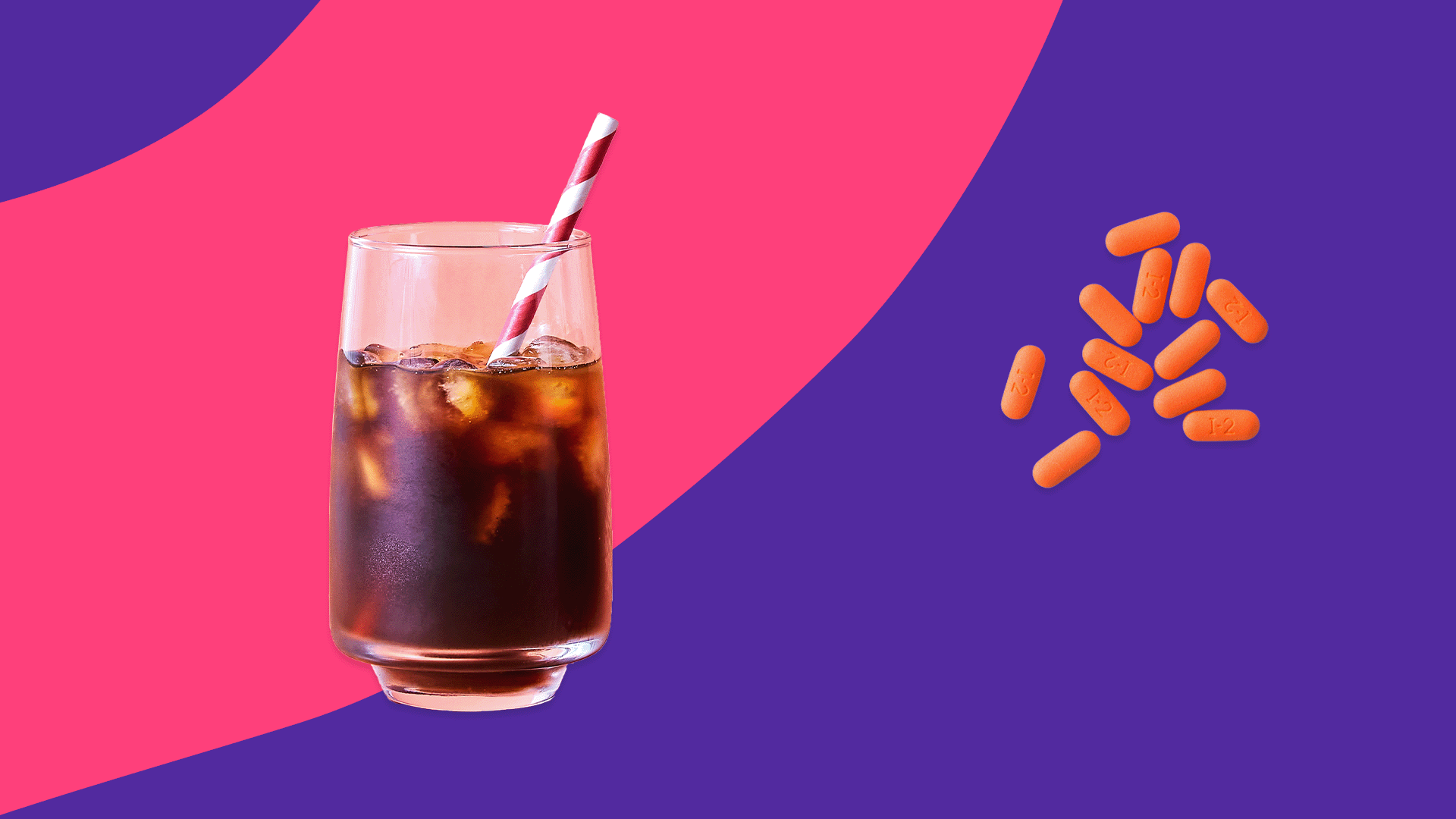It’s well-known that caffeine wakes people up and energizes them—most of us can’t live without our daily caffeine fix. But there’s also evidence that caffeine can help manage pain. You may have noticed that caffeine is an ingredient in popular pain relievers like Excedrin. You may have also heard that a strong cup of coffee can relieve headaches and migraines.
If you deal with pain on a regular basis—or even just occasionally—you may wonder if caffeine can help you. Let’s take a look at caffeine pain relief: how it works, what types of pain caffeine can help with, and the safest, most effective ways to use caffeine to reduce pain.
How does caffeine help with pain relief?
Caffeine is a central nervous system stimulant that occurs naturally in plants like tea leaves and coffee beans. It can also be produced synthetically and is frequently added to medications and supplements. The theory behind why caffeine helps with pain relief has to do with how it affects the body’s adenosine receptors. According to a 2016 study published in Anesthesia and Pain Medicine, caffeine may block specific adenosine receptors that affect pain, thereby reducing pain sensations.
Does Excedrin have caffeine?
Excedrin is probably the most well-known pain reliever with caffeine added. But other common pain relievers—including products containing paracetamol or ibuprofen—often have added caffeine. Sometimes cold medicines contain caffeine as well. “Caffeine is included in many OTC pain relief medications because it appears to meaningfully boost pain relief,” explains Jacob Hascalovici, MD, a pain specialist and chief medical officer at Clearing.
You may be wondering if caffeine can be used on its own to manage pain. Could coffee or espresso have a similar pain-relieving effect? Michael H. Lowenstein, MD, a quadruple board-certified anesthesiologist, explains that caffeine can provide pain relief on its own. Still, it works even better when combined with medication, he says. For example, studies have found that adding caffeine to analgesics increases their pain relieving properties by 5%-10%.
RELATED: Can you drink coffee with aspirin?
Is caffeine a muscle relaxant?
Caffeine may act as a muscle relaxant in some circumstances, but not others, Dr. Lowenstein says. For example, caffeine acts as a muscle relaxant in the bronchial muscles of the lungs. “On the other hand, caffeine can increase the force and duration of contraction in skeletal muscle,” Dr. Lowenstein says. “Caffeine may also stimulate bowel movements increasing muscle contraction in the colon,” he adds. (This is why many of us use the toilet soon after ingesting our cup of morning joe.)
How effective is caffeine for different kinds of pain relief?
It’s clear that caffeine is a painkiller, but does caffeine help with issues like migraines/headaches or back pain? What about chronic pain, nerve pain, or muscle pain?
Dr. Hascalovici says that caffeine can be used successfully to treat various types of pain. “So far, caffeine has been found useful for helping reduce muscle pain due to overexertion and to general pain,” he explains. “It can also help relieve certain headaches, such as hypnic headaches, postdural puncture headaches, and some migraines.” Hypnic headache are an uncommon headache syndrome with recurrent episodes of throbbing or dull head pain only during sleep.
Additionally, caffeine can be helpful for pain related to inflammation, such as the pain that comes from arthritis, says Dr. Hascalovici. Caffeinated beverages, including teas and coffee, contain antioxidants that can also help with inflammatory pain, he says.
What are therapeutic doses of caffeine for pain?
If you are taking medication with added caffeine, you should only take the recommended dose of medication (which is routinely listed on the package). Studies have found 100-130 mg of caffeine added to drugs such as ibuprofen or paracetamol is a safe and effective dose. If you are using caffeinated beverages to help with pain, consult your healthcare provider for dosage information. Most experts recommend that healthy adults should not exceed 400 mg of caffeine per day, which is about four cups (8 oz) of coffee per day.
RELATED: 10 health benefits of coffee
How does sleep deprivation contribute to pain?
Research has found that sleep deprivation may cause us to be more susceptible to pain. “Sleep deprivation is a known risk factor for chronic pain, but the mechanisms underlying this relationship are not fully understood,” explains Dr. Lowenstein. Since caffeine is known to help keep people awake and alert, there’s merit to the idea that caffeine could counteract the effect that sleep deprivation has on pain, Dr. Lowenstein contends. Still, more research needs to be done to understand the relationship between sleep deprivation and pain, he says.
Does caffeine ever cause pain?
The power of caffeine pain relief is established, but you may be wondering if caffeine ever does the opposite, and actually causes pain. In some instances, it can, says Dr. Hascalovic.
First, caffeine may make nerve pain worse. “Due to how it affects blood vessel dilation, caffeine may not be the best solution for nerve pain,” he notes. Moreover, people with irritable bowel syndrome or other digestive conditions may find that caffeine increases pain. “Not all people with gastrointestinal issues tolerate coffee well, and one outcome can be increased discomfort,” Dr. Hascalovic advises.
Special considerations and caffeine alternatives
Caffeine can be helpful at reducing pain, but shouldn’t be consumed at high doses. Consuming more than 400 mg of caffeine a day can increase insomnia, which may make pain feel worse. Excessive amounts of caffeine also increases anxiety, blood pressure, heart rate, and make you more prone to an upset stomach and dehydration.
Additionally, there are certain people who limit their caffeine or who shouldn’t consume caffeine at all. These include:
- Children
- Pregnant people
- People with high blood pressure
- People with acid reflux or ulcers
- People with irregular heart rhythms
- People taking medications that are not compatible with caffeine
If you are unsure if using caffeine for pain relief is right for you, consult your healthcare provider. There are many effective alternatives to using caffeine to relieve pain, including pain medications like acetaminophen or ibuprofen without added caffeine, topical pain relievers like lidocaine, heating pads, topical capsaicin cream, botulinum toxin injections, physical therapy for pain, exercise, acupuncture, and therapeutic massage.
READ NEXT: How caffeine affects hormones











